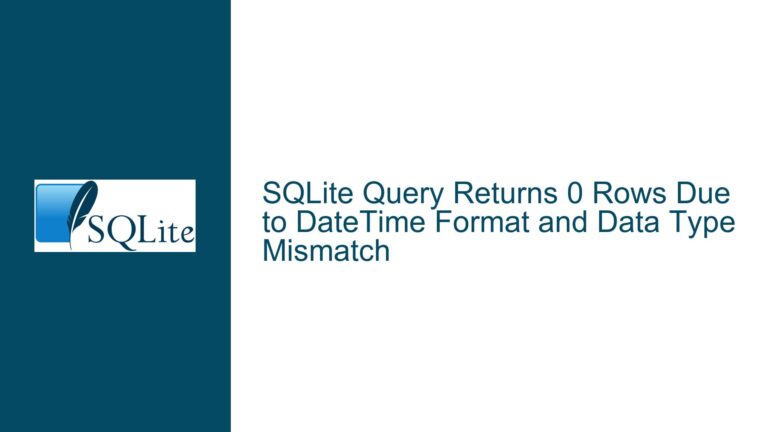Updating Column Based on Another Table’s Data and Conditional Execution in SQLite
Scenario: Conditional Column Updates Using Cross-Table Validation
The task involves two tables:
cartable with columnsvendor,model, andother.gametable with columnsplayer,car_model,car_exist, andother.
The goal is to update the car_exist column in the game table to reflect whether the car_model value exists in the model column of the car table. The desired outcome sets car_exist to "Yes" when a match exists and "No" otherwise. A secondary requirement involves conditionally executing this update only if the car table exists and contains data.
This scenario highlights two interconnected challenges:
- Data-Driven Column Updates: Dynamically modifying column values based on cross-table relationships.
- Conditional Query Execution: Ensuring SQL logic runs only when prerequisite schema and data conditions are met.
The initial solution uses an UPDATE statement with a correlated subquery to validate car_model existence. The follow-up question introduces conditional execution logic, which requires understanding SQLite’s metadata tables and procedural limitations.
Complications: Schema Dependency Checks and SQLite’s Procedural Limitations
1. Missing or Invalid Table References
SQLite validates all table references at query compilation. If the car table does not exist when the UPDATE statement runs, the query fails with a "no such table" error. This prevents using ad-hoc conditional logic (e.g., IF car EXISTS THEN UPDATE...) directly within SQL.
2. Empty Source Table Ambiguity
If the car table exists but is empty, the car_exist column would universally update to "No". However, this might not align with user intent if the emptiness is temporary or erroneous. Distinguishing between "table does not exist" and "table exists but is empty" requires explicit checks.
3. Lack of Procedural Control in SQLite
SQLite does not support procedural extensions like IF-THEN blocks or dynamic DML execution. All table references must be statically defined, and conditional logic must be embedded within individual statements or handled externally (e.g., via application code).
4. Data Model Denormalization
The absence of primary keys or foreign keys in the original schema complicates joins and updates. For example, the REPLACE strategy proposed in the discussion requires a primary key to identify conflicting rows. Without explicit keys, unintended data replacement or duplication may occur.
Resolution: Cross-Table Validation Techniques and Conditional Execution Workarounds
1. Basic Cross-Table Validation Using Correlated Subqueries
The foundational solution uses an UPDATE statement with a CASE expression and correlated subquery to check for car_model existence:
UPDATE game
SET car_exist = CASE
WHEN EXISTS (
SELECT 1
FROM car
WHERE model = game.car_model
) THEN 'Yes'
ELSE 'No'
END;
Breakdown:
- Correlated Subquery: The subquery
SELECT 1 FROM car WHERE model = game.car_modelruns for each row ingame, checking if the currentcar_modelexists incar.model. - CASE Expression: Maps the subquery result to "Yes" or "No".
Optimization:
- Add an index on
car.modelto accelerate lookups:CREATE INDEX idx_car_model ON car(model);
2. Conditional Execution via External Schema Checks
Since SQLite lacks procedural control, conditional execution must occur outside SQL (e.g., in Python, JavaScript, or shell scripts). Below is a Python example:
import sqlite3
conn = sqlite3.connect('database.db')
cursor = conn.cursor()
# Check if 'car' table exists
cursor.execute("""
SELECT EXISTS (
SELECT 1
FROM sqlite_schema
WHERE type = 'table'
AND name = 'car'
)
""")
table_exists = cursor.fetchone()[0]
if table_exists:
# Check if 'car' table is non-empty
cursor.execute("SELECT EXISTS (SELECT 1 FROM car)")
car_has_data = cursor.fetchone()[0]
if car_has_data:
cursor.execute("""
UPDATE game
SET car_exist = CASE
WHEN EXISTS (
SELECT 1
FROM car
WHERE model = game.car_model
) THEN 'Yes'
ELSE 'No'
END
""")
conn.commit()
else:
print("Skipping update: 'car' table is empty")
else:
print("Skipping update: 'car' table does not exist")
conn.close()
3. Alternative Data Replacement Strategy Using REPLACE and LEFT JOIN
If the game table has a primary key, use REPLACE INTO to rebuild the table with updated car_exist values:
-- Add primary key if missing
CREATE TABLE game_temp (
player TEXT,
car_model TEXT,
car_exist TEXT,
other TEXT,
PRIMARY KEY (player, car_model)
);
INSERT INTO game_temp
SELECT
player,
car_model,
CASE WHEN car.model IS NULL THEN 'No' ELSE 'Yes' END AS car_exist,
other
FROM game
LEFT JOIN car ON car.model = game.car_model;
DROP TABLE game;
ALTER TABLE game_temp RENAME TO game;
Steps:
- Create a temporary table with the desired schema (including a primary key).
- Populate it using a
LEFT JOINto determinecar_exist. - Replace the original
gametable.
Advantages:
- Atomic replacement avoids partial updates.
- Explicit schema definition enforces data integrity.
Caveats:
- Requires downtime during table replacement.
- All indexes and triggers must be recreated.
4. Combining Schema Checks Within a Single Query
For environments where external scripting is impractical, combine schema checks and updates using INSERT/SELECT with WHERE clauses. Example:
-- Update only if 'car' exists and is non-empty
UPDATE game
SET car_exist = CASE
WHEN (
SELECT EXISTS (
SELECT 1
FROM sqlite_schema
WHERE type = 'table'
AND name = 'car'
)
AND EXISTS (SELECT 1 FROM car)
AND EXISTS (
SELECT 1
FROM car
WHERE model = game.car_model
)
) THEN 'Yes'
ELSE 'No'
END;
Breakdown:
- The innermost
EXISTSchecks forcar_modelmatches. - The middle
EXISTSverifies thecartable is non-empty. - The outermost
EXISTSconfirms thecartable exists.
Limitations:
- This updates all rows to "No" if
caris missing or empty, which may not be desired.
5. Normalization and Indexing Best Practices
To prevent future issues:
- Define Primary Keys:
CREATE TABLE car ( vendor TEXT, model TEXT PRIMARY KEY, other TEXT ); CREATE TABLE game ( player TEXT, car_model TEXT, car_exist TEXT, other TEXT, PRIMARY KEY (player, car_model) ); - Add Foreign Key Constraints:
PRAGMA foreign_keys = ON; CREATE TABLE game ( player TEXT, car_model TEXT REFERENCES car(model), car_exist TEXT, other TEXT, PRIMARY KEY (player, car_model) );Note: Foreign keys enforce referential integrity but require
PRAGMA foreign_keys = ON.
Final Recommendations
- Use External Conditional Logic: Handle table existence and emptiness checks in application code for clarity and control.
- Index Critical Columns: Accelerate subqueries and joins with indexes on
car.modelandgame.car_model. - Normalize Schema: Define primary/foreign keys to avoid data anomalies.
- Prefer Joins Over Correlated Subqueries: For large datasets,
LEFT JOINoften outperforms correlated subqueries.
By combining these strategies, you ensure robust cross-table updates while mitigating SQLite’s procedural limitations.






